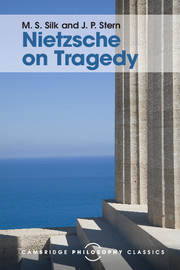Book contents
- Frontmatter
- Dedication
- Epigraph
- Contents
- Preface to this edition
- Preface
- Note
- 1 Germany and Greece
- 2 Biographical background I: Nietzsche and his early interests
- 3 Biographical background II: the genesis of The Birth of Tragedy
- 4 The argument of The Birth of Tragedy
- 5 The aftermath
- 6 Nietzsche's account of Greece
- 7 Mode and originality
- 8 Tragedy, music and aesthetics
- 9 Nietzsche and earlier German theories of tragedy
- 10 Style and philosophy
- Bibliography
- Index
8 - Tragedy, music and aesthetics
Published online by Cambridge University Press: 05 August 2016
- Frontmatter
- Dedication
- Epigraph
- Contents
- Preface to this edition
- Preface
- Note
- 1 Germany and Greece
- 2 Biographical background I: Nietzsche and his early interests
- 3 Biographical background II: the genesis of The Birth of Tragedy
- 4 The argument of The Birth of Tragedy
- 5 The aftermath
- 6 Nietzsche's account of Greece
- 7 Mode and originality
- 8 Tragedy, music and aesthetics
- 9 Nietzsche and earlier German theories of tragedy
- 10 Style and philosophy
- Bibliography
- Index
Summary
The Birth of Tragedy and Aristotle's Poetics
The Birth of Tragedy represents Nietzsche's most sustained attempt at a theory of art. Apart from the late essay, The Wagner Case, and its companion piece, Nietzsche Contra Wagner, it is his only book in which art occupies a central place, even though musical and literary criticism and aesthetic speculations abound in all his writings. Those who discuss Nietzsche's views on art often treat his books as if they were separate chapters of one continuous work. The coherence of this œuvre is sometimes strongly affirmed, sometimes denied, but the whole sequence is taken to be a single work in the sense that excerpts from different parts of it may be played together, like cards from a single pack, without further ado. Allowance is usually made for Nietzsche's revaluation of Wagner, which is too obvious a reversal to be ignored; this apart, the question of development or changes of mind is hardly raised.
This procedure is unacceptable. Whatever may be said of Nietzsche's thought as a whole, the fact is that, despite continuities, his view of art does develop and change, and nowhere is the development more marked than between BT and the work of the later 1870s and 1880s. That development proceeds in conjunction with the revaluation of Wagner, but is not restricted to it. In opposition to the thesis put forward in BT, the later Nietzsche will espouse the ideals of classicism, partly with reference to French culture; he will express hostility to the theatre; he will be able to see convention as ‘the condition of great art, not an obstacle to it’ and art itself as ‘the cult of the untrue’ – and insofar as these two propositions are relatable to his earlier conception of art, it can only be to his conception of Apolline art. A further important change, implicit in this last pair of instances, will be the tendency to equate all forms of art at the expense of those distinctions to which BT is devoted. In this development tragedy must forfeit much of its special status – and so too will music, which, as far as the post-Wagnerian Nietzsche is concerned, is no longer ‘a universal language for all time’ or a language with a unique, metaphysical power.
- Type
- Chapter
- Information
- Nietzsche on Tragedy , pp. 273 - 355Publisher: Cambridge University PressPrint publication year: 2016

